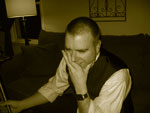Of Phones, Motherhood, and Miracles
Michael Dean Clark
 In his book, Guns, Germs, and Steel, Jared Diamond comes to one of those inverse conclusions that seem so interesting given the degree of change that happens in such a small linguistic alteration. After looking at the development of various cultures in history, he writes that the old adage “necessity is the mother of invention” is actually more correct when reversed. Technological advancement happens because invention creates the sensation (reality?) of necessity.
In his book, Guns, Germs, and Steel, Jared Diamond comes to one of those inverse conclusions that seem so interesting given the degree of change that happens in such a small linguistic alteration. After looking at the development of various cultures in history, he writes that the old adage “necessity is the mother of invention” is actually more correct when reversed. Technological advancement happens because invention creates the sensation (reality?) of necessity.
A crude analog: give up your cell phone.
When the cramps that idea creates in your stomach subside, think about it. About a year ago, my then six-year-old daughter heard me mention a wall-mounted phone and asked what exactly that was. We’ve never had a home phone in her lifetime, so I gave her the best description I could, feeling more and more that this is exactly how sci-fi writers create new technology from old. Her response sounded a lot more like when I give my college freshmen history lessons about the 90s.
“So, wait,” she said, her face twisted in a thinking frown. “You called a place and the other person had to be there? What happened if they were gone?”
“You called back later,” I said.
“Did you at least leave a voicemail?”
“For a long time, none of my friends had that. And the ones who did had what was called an answering machine separate from the phone that taped what the person calling said.”
“That…is so…weird,” she said, then whistled, then turned and looked silently out the window. Later, she told me that she needed “time to fit the whole phone thing into my head.”
In this, Diamond’s idea seems pretty spot on. I got along just fine before the phone moved from the kitchen counter to my pocket. Sure, it was a pain to miss the call I was waiting for, or to get a busy signal when I finally worked up the courage to call some girl (who most likely left the phone off the hook for just that purpose), or when I stroked in a six rather than a seven on the rotary dial and had to start over.
But now that I have a cell phone, the idea of not being able to call other people on their corresponding always present, always on wireless seems absurd. In fact, if I hadn’t been in grad school the last four years, I’d be writing about how foreign the idea of living without an iPhone is. And this, as most things do, got me thinking about writing.
There are many aspects of my writing process that remain (thankfully) hidden from me. One of them is what exactly drives an idea from invention to necessity. After I’m done, I can see the evidence in the sum total of the story I’ve wrangled. But in the moment, it’s never that apparent.
Some say I shouldn’t worry about trying to understand that; that the analysis will ruin the magic. In some ways, I agree. There are so few miracles left (we’re told anyway) that we should protect the ones we still have. But miracles are miraculous because they are rare, and that’s why I can’t quite leave the one most common to me as a writer to sit uncelebrated.
I can’t chalk up the times when meaning happens rather than is created to the firing of neurons intersecting with the various and sundry contexts and conditions shaping my experience. The science of the intellect does a lot of things well – inspiration is not one of them.
In a sense, the moment of the creative breakthrough is the realization that I’ve become attached to my cell phone. All along, the mechanism of the story (and telling it) has carried its own logic. I learn and internalize the rules of the world I’m expressing to the point that I carry them around with me like the Motorola in my pocket. Only later do I see where something beyond any abilities I possess intervened to make something less than usual out of it all.
Michael Dean Clark is an author of fiction and nonfiction, as well as a professor of writing at Point Loma Nazarene University in San Diego, California. His wife and two children are currently preparing for a different type of deadline – the birth of a new brother and son in February.